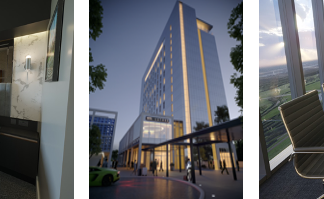The remote working practices forced on us by Covid-19 have been both a blessing and a curse, depending on who you ask. While many have welcomed more time spent at home with loved ones, others have longed for the social element and escape that remote working struggles to provide.
The pandemic has highlighted the need for flexibility, providing people with the freedom to spend their time wherever and however suits them best. Now, the events and marcomms sector must take note of this adjustment and adapt accordingly, adopting a hybrid approach that provides attendees with an outstanding experience no matter where they are.
Giving attendees choice
Events have long been a way for businesses to bring current and future customers together and engage with them effectively. But when the pandemic put a halt to most in-person activity, the marcomms sector was forced to adapt. The result was the rapid ascent of virtual events, with Forbes reporting a 1,000% increase during the first few months of the pandemic.
Restrictions have since eased, but many have grown accustomed to the extra hours their pandemic routine created, which were free to dedicate to hobbies, health and the people and things they love most. For some, a return to long-distance travel and overnight stays for a few hours of networking won’t be a cause for celebration.
Hybrid events, blending in-person and virtual, put the choice back in the hands of delegates so they can engage with content they are most interested in, when they want, how they want. Those without the time to commit to in-person events can forgo the arduous travel, while those still keen to engage face-to-face aren’t denied the opportunity either.
In marcomms, engagement is king. Hybrid events create greater opportunity to garner a larger audience and provide all with a platform to enjoy the content and network. In turn, this vastly improves a business’s ability to collect and utilise attendee data, grow the brand, and generate valuable new leads.
Easy access
Remote attendance was once an afterthought for businesses — some 65% of pre-Covid briefs Live Group received were for in-person events, but the pandemic has helped many to realise the benefits of a flexible approach. In fact, many businesses are now planning hybrid events as far forward as the end of 2022.
Consequently, the virtual experience is improving and evolving at a pace, with operators developing and perfecting platforms like Live Group’s virtual platform to host virtual content and facilitate better networking opportunities. The aim here is to provide a ‘front-row seat’ experience for all delegates, whether they make it to the venue or view proceedings from their homes. While the nature of the experience will differ, the quality of the event will remain sky-high.
Moreover, the sheer increase in the number of delegates taking part in a hybrid event widens the pool of personality types that can engage with the content. In turn, this increases cultural diversity and improves the value of the engagement by bringing those with common interests but differing minds together.
Supporting sustainability
Not only does the reduced need to travel provide greater convenience to attendees, but it also benefits sustainability efforts in the industry.
Pre-Covid, the events industry emitted 1.2bn kg of CO2e from diesel generators alone per year[1] . That’s excluding the environmental cost of countless trips made by thousands of delegates, with the UK alone hosting 1.3m business events annually.
If businesses and operators alike continue to commit to the hybrid event model, we will undoubtedly see a significant decline in the environmental cost of in-person events.
The future matters
When considering the future of your business, forethought and anticipation of trends are often vital to its longevity. Post-lockdown, this could not be truer.
Although many firms have made great strides in ensuring they are prepared for a return to the workplace, there will likely be a permanent mindset shift amongst employees. Appreciating the extra time remote working practices have offered, just 15% welcome a return to the office full-time[2]. Similar to the choice many organisations have now begun giving their employees between the office and a hybrid workstyle, the same desire for flexibility persists in the events industry and should not be ignored. Consequently, businesses may begin to see a greater return on investment when they take into account the behavioural shifts of their audience and transition to hybrid events.
For those still on the fence, the figures paint a stark reality. A recent study by LinkedIn found that 77% of B2B event organisers surveyed were looking to organise hybrid events, with investment in virtual set to reach three-times that of physical in the next 12 months.[3]
Now or never
Many businesses are likely missing out on customers and revenue due to the time costs of travelling to and from live events. Now, with 52% of employees enjoying a better work-life balance as a result of the pandemic, many will have less time than ever to spare[4].
But investing in hybrid event provision isn’t just a matter of maintaining pre-Covid attendance figures. By providing options, businesses can attract new attendees by making events accessible to all — those that get the most out of an event by attending in person, those short on time, as well as those that prefer to listen, learn, and network from the comfort of their own home.
By Toby Lewis, CEO at Live Group
[1] https://www.conference-news.co.uk/news/uk-events-industry-emits-12bn-kg-co2e-every-year-says-report
[2] https://www.personneltoday.com/hr/fewer-than-one-in-six-want-to-work-in-office-full-time/
[3] https://marketingtechnews.net/news/2021/jun/01/virtual-events-set-to-grow-in-popularity-post-pandemic/
[4] https://employeebenefits.co.uk/52-of-uk-employees-enjoy-a-better-work-life-balance-after-home-working/












